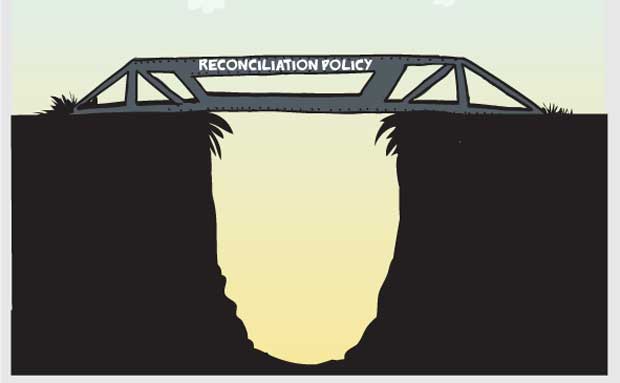Reply To:
Name - Reply Comment

At the historic January 2015 presidential election it was widely accepted that a huge minority community vote played a key role in the victory of Maithripala Sirisena.
Some two and half years later at a meeting on May 2, the Cabinet approved a National Reconciliation Policy presented by President Sirisena. This policy was drafted by the Office for National Unity and Reconciliation (ONUR) chaired by former president Chandrika Bandaranaike Kumaratunga. The ONUR was set up in September 2015 but there were delays or drawbacks and some analysts raise valid questions as to whether the National Government was acting now largely because the jolt it got from the record crowd that attended former president Mahinda Rajapaksa’s joint opposition May Day rally at the Galle Face Green.
The national reconciliation policy had been finalized in September last year after a comprehensive one-year consultation process with multiple stakeholders. They included government officials, mainly those from the Ministry of National Integration and Reconciliation, the Secretariat for Coordinating Reconciliation Mechanisms, the Ministries of Justice, Education and Women’s Affairs, the Ministry of National Coexistence, Dialogue & Official Languages, provincial councils, civil society, academics, youth, women and victims’ representatives and grassroots activists.
According to a report obtained by the Daily Mirror, the policy draws on the findings of previous national initiatives including the Lessons Learnt and Reconciliation Commission (LLRC) report, the Udalagama Commission report and the Paranagama Commission report.
The policy declares it will serve as the State policy on reconciliation and provide direction to the process. It will also provide a guiding framework to all stakeholders working to achieve coherence in reconciliation initiatives.
According to the document approved by the Cabinet, the draft policy will fill a long-standing vacuum due to the absence of a consolidated national policy on this issue. It will aim to satisfy the need of the country for an over-arching vision on reconciliation and a broad, coherent framework to steer and direct the process. In this regard, it declares that, “Acknowledging that while several reconciliation initiatives are underway, there does not exist an expressed declared policy by the Government of Sri Lanka on the subject; hence this national policy on reconciliation aims to bridge this gap.”
President Sirisena, commenting on the document when it was first presented last year said the policy has been drawn up “in a manner that reflects that reconciliation is a whole-of-government effort and a multi-stakeholder endeavour.” It was decided that further discussions and consultations be held by ONUR and on May 2 the final revised national reconciliation policy was presented by the President with the approval of the National Coexistence, Dialogue & Official Languages Minister Mano Ganeshan. When the policy was first presented last September, Mr. Ganeshan had reportedly complained he had not been consulted though he was the Minster in charge of these vital areas. But valid questions have been asked as to why the consultations took as many as nine months.
The final draft has laid down policy principles which it defines as a set of actionable principles and long-term goals that will form the basis for making rules and guidelines and to provide overall direction to planning and development for national reconciliation. We hope action means action and not just policies or words which we have seen to a large extent up to now.
These hopefully action-oriented principles include equality, human rights, justice and the rule of law, transitional justice, inclusivity and diversity, sustainable development, civic consciousness and others.
The policy has identified some critical issues -- conflict sensitivity, cross-cultural awareness, victim-centeredness, gender responsiveness, foresight and innovation, leadership and sustainability, efficiency and effectiveness, coordination and complementarity and clear and consistent communication.
The document says the policy envisages the launching of public awareness and education campaigns with strict monitoring programmes to ensure the implementation of the policies. Nice or wise words indeed but we hope action will mean action and not just words.